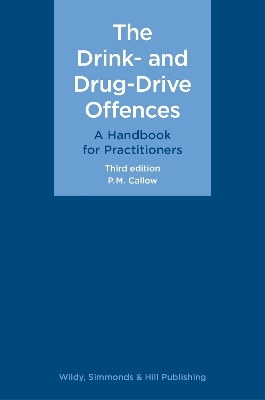
The Drink- and Drug-Drive Offences: A Handbook for Practitioners
Wildy, Simmonds and Hill Publishing (Verlag)
978-0-85490-302-3 (ISBN)
This third edition takes account of some forty judgments of the appellate courts since the publication of the second edition. The more recent challenges to the drink- and drug- driving regimes have taken on a somewhat different character from before. While the interpretation of the statutory road traffic provisions continues to be developed in the case law, other issues are coming to the fore.
The case law on the circumstances in which judicial review is appropriate has been drawn together. This line of cases often features contested decisions on adjournments – common issues are lack of diligence in preparation for trial and/or failure by the court below properly to scrutinise the application for adjournment. The appellate courts have remained constant in insisting on “rigorous scrutiny” of requests for adjournments and have robustly applied the Criminal Procedure Rules aimed at avoiding delay.
In this edition, the commentary on the difficult cases of DPP v Carless [2005] EWHC 3234 (Admin) and R v Coe [2009] EWCA Crim 1452 has been revised to emphasise that neither case sets a precedent for the admission in evidence of the analysis of blood specimens taken outside the regime of the Road Traffic Act 1988.
This practical and accessible book is intended for all practitioners concerned with this area of law, whether police, prosecution, defence, or court officials, and adopts a neutral standpoint between their various interests.
P. M. Callow LL.M, Ph.D is also the author of Drink- and Drug-Drive Case Notes (3rd ed, 2015; 4th edition in preparation) and co-author of Wildy’s Handbook for Magistrates (3rd ed, 2012), both published by Wildy, Simmonds & Hill Publishing.
Table of Cases
Table of Statutes
Table of Statutory Instruments, Codes of Practice, etc
Table of Conventions
Preface
1.INTRODUCTION
1.1The background
1.2The offences
1.3The Investigation
1.4Definitions
1.5Use of specimens in proceedings
1.6Trial
1.7Penalties
1.8The MG DD forms
1.9The Crown Prosecution Service
1.10 Railways, tramways, shipping and aviation
2.PRELIMINARY TESTS
2.1Introduction
2.2Stopping of vehicles
2.3Trespass and bad faith
2.4The prerequisites
2.5Preliminary breath test
2.6Preliminary impairment test
2.7Preliminary drug test
2.8Power of arrest
2.9Power of entry
2.10 Time For caution
3.EVIDENTIAL BREATH SPECIMENS
3.1Introduction
3.2The power to require specimens
3.3The place at which specimens may be required
3.4The breath analysis device
3.5The procedure for requiring specimens
3.6Lower breath reading to be used
3.7Conclusion of the breath analysis procedure
4.BLOOD AND URINE SPECIMENS
4.1Introduction
4.2The place at which specimens may be required
4.3Medical reasons why breath cannot be provided or should not be required
4.4Device unreliable, unavailable or impracticable to use
4.5Device not having produced a reliable indication
4.6Specimens for drug testing
4.7Relationship between blood and breath specimens
4.8Choice of specimen: blood or urine
4.9Time for providing urine specimen
4.10 Failing without reasonable excuse to provide
4.11 The statutory warning
4.12 Consent to the taking of a blood specimen
4.13 The procedure for making the requirement
4.14 Taking and dividing the specimen
4.15 The analysis
4.16 Detention following the procedure
5.INCAPACITY TO CONSENT AND HOSPITAL PATIENTS
5.1Persons incapable of consenting
5.2Hospital patients
6.CAUSING DEATH
6.1 Introduction
6.2 Causing death
6.3 Driving without due care and attention
6.4 Driving inconsiderately
6.5 Other persons
6.6 Unfit or with excess alcohol or drugs
6.7 Failure to provide specimens
7.UNFITNESS TO DRIVE
7.1 Introduction
7.2 The meaning of ‘unfit to drive’
7.3 Evidence of unfitness
7.4‘ Drink or drugs’
7.5‘ Drug’
7.6 Power of arrest
7.7 Power of entry
7.8 No likelihood of driving
8.THE EXCESS ALCOHOL AND DRUGS OFFENCES
8.1 Introduction
8.2 ‘Drives’
8.3 Attempting to drive
8.4 Motor vehicle
8.5 Road
8.6 Other public place
8.7 Consuming
8.8 The prescribed and specified limits
8.9 The statutory assumption
8.10 The exception to the statutory assumption
8.11 Back-calculations
8.12 Aiding and abetting
8.13 Excess drugs: the medical defence
8.14 The defence of duress or necessity
8.15 The defence of insanity
9.THE ‘IN CHARGE’ OFFENCES
9.1 Introduction
9.2 In charge
9.3 Likelihood of driving
9.4 No likelihood of driving
10.THE ‘FAILING’ OFFENCES
10.1 Introduction
10.2 The offences
10.3 The elements of the offences
10.4 The burden of proof
10.5 The meaning of ‘fail’
10.6 ‘Reasonable excuse’
10.7 Circumstances which constitute reasonable excuse
10.8 Whether requirement made
10.9 Warning of the consequences of failure
11.TRIAL, EVIDENCE, PROCEDURE
11.1 Mode of trial
11.2 The information
11.3 Documentary evidence concerning specimens
11.4 Disclosure
11.5 The MG DD forms
11.6 Adjournments
11.7 Video recordings
11.8 Identification
11.9 The discretion to admit or exclude evidence
11.10 Advice, assistance and representation
11.11 The Justices
11.12 Re-opening the prosecution case
11.13 Stay of proceedings
11.14 Alternative verdicts
11.15 Appeals
12.PENALTIES
12.1 The penalties
12.2 Personal mitigation
12.3 Guilty pleas
12.4 Ancillary orders
12.5 Purported rescission of sentence
12.6 Costs
13.SPECIALREASONS FOR NOT DISQUALIFYING
13.1 Introduction
13.2 Evidence
13.3 Special to the offence: the four criteria
13.4 The seven-point checklist
13.5 The distance driven and the degree of danger
13.6 Emergencies
13.7 Laced drinks
13.8 Other special reasons
13.9 Failing to provide specimens
13.10 Argument available once only
13.11 The discretion not to disqualify
13.12 Summary
Index
| Erscheinungsdatum | 02.05.2024 |
|---|---|
| Verlagsort | London |
| Sprache | englisch |
| Maße | 152 x 229 mm |
| Gewicht | 715 g |
| Themenwelt | Recht / Steuern ► EU / Internationales Recht |
| Recht / Steuern ► Strafrecht ► Besonderes Strafrecht | |
| Recht / Steuern ► Strafrecht ► Strafverfahrensrecht | |
| ISBN-10 | 0-85490-302-X / 085490302X |
| ISBN-13 | 978-0-85490-302-3 / 9780854903023 |
| Zustand | Neuware |
| Informationen gemäß Produktsicherheitsverordnung (GPSR) | |
| Haben Sie eine Frage zum Produkt? |
aus dem Bereich


